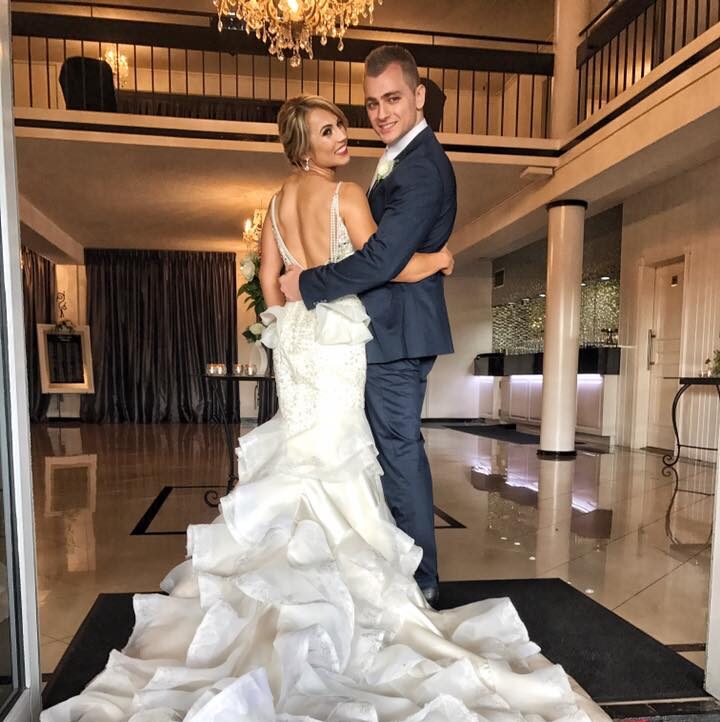As a father, standing up to give the Father of the Bride toast on your daughter’s big day is both a privilege and a challenge. It’s a moment filled with emotion—pride, joy, and yes, a bit of nervousness. You want to share your love for your daughter, welcome your new son-in-law, and maybe even add a bit of humour to keep things light.
But how do you make sure your speech is memorable? In this guide, I’ll walk you through every step, from crafting the perfect words to delivering them with confidence, so you can make a lasting impression. Whether you’re toasting in a grand ballroom or a cozy wedding reception venue, these tips will ensure your speech is one to remember.
Why Your Father of the Bride Wedding Toast Matters More Than You Think
As a father, your role in the wedding is unique. While others may see it as just a ceremony or a big celebration, for you, it’s a personal milestone. This toast is your chance to reflect on years of love, laughter, and memories. It’s a moment that will stay with both you and your daughter forever.
The Father of the Bride wedding toast is often one of the most anticipated parts of the reception. Everyone is eager to hear what you have to say. And why wouldn’t they be? You’ve known your daughter her whole life—you’re the one who’s seen her grow, faced the tough times with her, and now, you’re there to hand her over to a new chapter.
As the first speaker, you have the power to set the tone for the evening. Your words can lift the spirits of the crowd, spark a laugh, and maybe even bring a tear to someone’s eye. It’s a rare chance to publicly show how proud you are and to celebrate a moment that marks the end of one era and the beginning of another.
This is a time to stand tall and speak from the heart, because your words matter. When you get it right, the toast will become an unforgettable part of the day, not just for your daughter but for everyone present.
Essential Elements for Crafting Your Father of the Bride Wedding Toast
When preparing for this momentous speech, the last thing you want is to get up there and go blank. That’s why having a structure in mind can help ease any nerves. There’s no “one-size-fits-all” formula, but having a solid framework ensures that you cover the key points while giving yourself the flexibility to add your personal touch.
The Ideal Structure: Organising Your Thoughts for Maximum Impact
Let’s start with a basic structure that’s been tried and tested over the years. You’ll want to begin by welcoming the guests, followed by a heartfelt tribute to your daughter, then welcoming your new son-in-law. After that, some words of wisdom are always a nice touch, and finally, your toast. If you stick to this simple outline, you won’t go wrong.
Here’s a quick breakdown of each part:
- Welcome and Introduction – Start by greeting the guests warmly and expressing gratitude for their presence. You can add a light-hearted joke here if you’re comfortable with it. Think of it as setting the stage for the evening’s celebrations.
- Tribute to Your Daughter – This is the heart of the speech. Share stories, memories, and the qualities that make your daughter the incredible woman she is. Be personal, genuine, and, most importantly, honest.
- Welcome the Partner – Take a moment to officially welcome your new son-in-law into the family. Share your thoughts about their relationship and the joy it brings you to see them start their new life together.
- Words of Wisdom – Offer some heartfelt advice for a happy marriage. Keep it simple, relatable, and drawn from your own experiences.
- Well Wishes and Toast – Finish with heartfelt well wishes and invite everyone to raise their glasses to the happy couple.
Key Components to Include in Your Speech
Now that we’ve got the framework, let’s take a closer look at what each section should include. The key here is to stay true to your voice and keep it genuine.
- Welcoming the Guests – This is a moment to thank everyone for coming. Mention specific people if necessary, like those who traveled far to be there. Make them feel appreciated.
- Sharing Stories – This is the emotional heart of your speech. Think back to the most meaningful moments you’ve shared with your daughter. Maybe it’s the first time she rode a bike, or a family holiday you’ll always remember. Those moments, no matter how small, shape the relationship you have with her.
- Acknowledging Your Daughter’s Strengths – Talk about the qualities that make her unique—her kindness, intelligence, determination, or sense of humour. Mention how proud you are of the woman she’s become.
- Welcome the New Son-in-Law – Don’t just welcome him in passing. Think about what makes him a great match for your daughter. Has he shown exceptional care and respect for her? Does he make her happy? Share your thoughts on their relationship, and let him know you’re thrilled to have him as part of the family.
By blending the personal and the emotional with a little humour, you’ll strike the perfect balance for an unforgettable speech.
Father of the Bride Toast Ideas: From Humour to Heartfelt
Crafting a Father of the Bride toast that blends humour with sentiment can be tricky, but when done right, it leaves a lasting impression. Here’s how to strike the perfect balance.
Weaving in Humour: Adding Laughter Without Crossing the Line
Humour helps to break the ice and ease the tension, but it’s important to keep it light and inclusive. Share funny stories about your daughter that are easy to relate to, like a childhood mishap or a moment from her early relationship with her partner.
Here’s how to do it right:
- Keep it light: Share harmless, funny anecdotes that reflect your daughter’s personality.
- Avoid inside jokes: Ensure the humour is relatable to everyone, not just a small group.
- Stay appropriate: Keep the jokes respectful and avoid anything that could make guests uncomfortable.
Crafting a Sentimental Toast: Expressing Love and Pride
While humour adds levity, the core of your speech should express your love and pride for your daughter.
Here’s how to make your sentiments hit home:
- Reflect on meaningful moments: Mention specific memories that highlight her growth or character.
- Speak from the heart: Keep the tone sincere and personal, focusing on your bond.
- Express pride: Talk about the qualities that make her unique and why you’re proud of the woman she’s become.
Father of the Bride Speech Tips: Avoid Common Pitfalls
As much as you want your speech to be perfect, there are a few common mistakes that can derail the moment. A bit of preparation can go a long way to help you avoid these traps and keep your toast on track. Here’s what to watch out for.
What to Avoid in Your Wedding Toast: Mistakes to Steer Clear Of
- Overcomplicating the Speech: The simpler, the better. Don’t overthink it—stick to your key points and let your emotions shine. A heartfelt speech doesn’t need to be complex.
- Going on for Too Long: Aim for 8-10 minutes. Longer speeches can lose the crowd’s attention and disrupt the flow of the evening. Keep it concise and impactful.
- Using Clichés or Platitudes: Avoid the generic phrases like “She’s the most beautiful bride” or “They were meant to be together.” Instead, share specific memories or unique aspects of their relationship that make your speech personal.
- Reading Word-for-Word: While it’s okay to use notes, try not to read directly from them. Speaking naturally makes your toast more heartfelt and engaging.
Dealing with Sensitive Topics: Divorce, Absent Loved Ones, and More
Family dynamics can be tricky, and it’s important to handle sensitive subjects with care. If there are difficult topics to address, here’s how to navigate them gracefully:
- Divorce: If you’re divorced, acknowledge your ex-wife’s role in raising your daughter. Keep the focus positive, and avoid unnecessary tension.
- Absent Loved Ones: If there are family members or friends who couldn’t attend, it’s okay to acknowledge them respectfully, but keep it brief.
Avoiding Former Relationships: While it’s natural to reflect on the past, avoid mentioning past relationships or ex-partners in a way that could cause discomfort or tension.
Father of the Bride Wedding Toast Examples to Inspire You
A great Father of the Bride toast can leave a lasting impression on everyone, and sometimes the best way to get started is by looking at examples. Here, we’ll explore a couple of different styles—one traditional and one more modern—to give you some inspiration for your own speech.
Classic and Traditional Father of the Bride Speech Examples
If you prefer to keep things classic, you might want to follow the timeless approach where you express love, pride, and best wishes without straying too far from tradition. Here’s an example of a traditional speech:
“Ladies and gentlemen, friends and family, it’s an honour to stand here today. As many of you know, I’ve had the pleasure of watching my daughter grow into the incredible woman she is today. From the first time I held her in my arms to the woman she’s become, I have always been so proud of her. And today, as I give her away, I couldn’t be happier to see her marry someone who will care for her and cherish her as much as we do. [Groom’s name], welcome to the family. We are thrilled to have you, and I know you’ll make her as happy as she deserves. To my daughter, I love you and wish you both a lifetime of happiness. Let’s raise our glasses to the happy couple!”
This speech keeps it simple, respectful, and heartfelt, focusing on love for the daughter, welcoming the groom, and ending with a toast.
Modern Father of the Bride Toast Ideas
If you’re looking for something a little more modern, you might consider adding a bit of humour, sharing some personal stories, and speaking more conversationally.
Here’s an example of a more relaxed and contemporary approach:
“Good evening, everyone! First off, I want to thank you all for being here to celebrate this special day with us. Now, I have to admit, when my daughter first told me she was getting married, I didn’t quite know how to react. I mean, she’s my little girl, and I’ve spent the past 30 years telling her what to do! But as I’ve gotten to know [Groom’s name] and see how happy he makes her, I know this is the right decision. [Daughter’s name], you’ve grown into an amazing woman, and I couldn’t be prouder of the person you’ve become. [Groom’s name], I’m glad you’re joining our family, and I know you two are going to have an incredible life together. To my daughter and her new husband, may your love grow stronger every day. Cheers!”
This example is a little lighter, with a dose of humour, but still heartfelt. It reflects the emotional journey of the father while keeping it more personal and less formal.
The Best Father of the Bride Speech Structure and Delivery Tips
Now that you’ve got the ideas and examples, let’s focus on the delivery. A perfect Father of the Bride speech isn’t just about what you say—it’s how you say it. The delivery is just as important as the words themselves. Here’s how to structure and deliver your speech for maximum impact.
Keeping it Short and Sweet: Why Less is More
As much as you might have a lot to say, remember that brevity is key. A speech that lasts too long can cause the energy in the room to dip, and guests might start to lose focus. Aim for about 8-10 minutes—just long enough to express your feelings without dragging it out.
Think of your speech as a well-timed movie scene: it doesn’t need to be long to be effective. A short, meaningful speech will have more impact and leave a lasting impression.
- Stick to the Key Points: Welcome the guests, tell personal stories, share your pride for your daughter, and offer a heartfelt toast. Keep it clear and concise.
- Avoid Going Overboard: If you’re tempted to add extra details, ask yourself if it adds value. If it doesn’t, it’s probably best to leave it out.
Rehearse, Practice, and Stay Calm: How to Deliver Your Toast Like a Pro
When you’re standing in front of a room full of people, nerves can easily take over. But the more prepared you are, the more confident you’ll feel.
Here’s how to get comfortable with your delivery:
- Practice Out Loud: Go over your speech several times before the big day, ideally in front of a mirror or a trusted friend. Practising aloud will help you feel the flow and timing.
- Use Cue Cards: It’s fine to have notes to refer to, but don’t rely on them too much. Try to glance at them only when necessary, so you don’t sound like you’re reading directly from a script.
- Keep Calm and Enjoy the Moment: It’s easy to get caught up in nerves, but remember, this is your moment to celebrate your daughter and her partner. Take a deep breath, stay calm, and enjoy it. If you get stuck, take a natural pause—everyone will appreciate the sincerity, and it gives you a moment to collect your thoughts.
Delivery is all about feeling confident and genuine. Practice, stay calm, and remember that everyone is there to celebrate your daughter and her new spouse. Your words will mean so much, regardless of whether you’re perfectly polished or a little nervous.
Crafting a Toast That Will Be Remembered for a Lifetime
When the time comes for your Father of the Bride speech, it’s your chance to show just how much your daughter means to you. This moment is an emotional milestone that everyone will remember. While it might feel intimidating, with the right approach, you’ll deliver a toast that resonates with your daughter, her new spouse, and all of your guests.
As you prepare for the big moment, here are a few final tips to ensure your speech is both heartfelt and impactful:
- Be Yourself: Don’t try to adopt a style that doesn’t feel natural. Whether you’re funny, sentimental, or a mix of both, let your personality come through in your words.
- Focus on the Couple: While this is your moment to speak about your daughter, it’s also important to acknowledge the love between her and her new husband. The focus should be on their journey together and the future they’ll build.
- Practice, But Don’t Memorise: Practice enough to feel confident, but don’t try to memorise every word. You want to sound genuine and not like you’re reading a script.
At the end of the day, your speech is a reflection of your love and pride for your daughter and her new life with her partner. That authenticity will resonate more than any perfectly rehearsed line.




